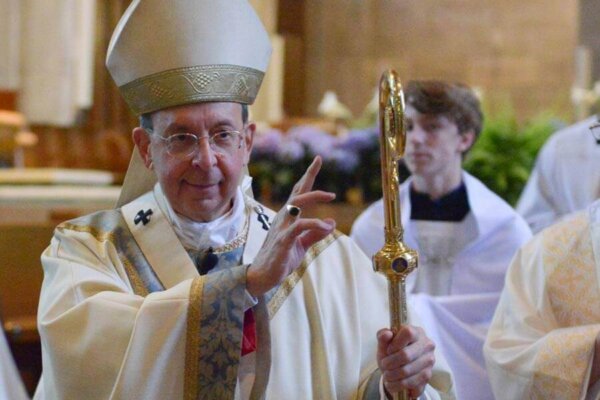30th Sunday
Pontifical North American College
October 27, 2024
The Lord Has Done Great Things for Us!
Every evening, we repeat the beautiful words of Mary’s canticle, the Magnificat, words we made our own again today as a response to the Word of God: “The Lord has done great things for us! We are filled with joy!” For us who pray the Liturgy of the Hours, those words are very familiar.
But do we really believe that God does great things for us? Or do we sometimes adopt the semi-pelagian view that it is we who do great things for ourselves with a bit of an assist from on high? Worse still, when we complain or feel sorry for ourselves, do we not put the great and mighty deeds of our God in the shadows?
As a young priest, I had great admiration for the pastor of a nearby parish, mostly because he was always cheerful. No matter what challenges he faced, he remained balanced and joyful. One day I got up the nerve to ask him why he was always happy. He answered, “It’s because I go to confession often. If God can forgive my sins [he said], what’s there for me to be unhappy about?” Not surprisingly there were long lines for confession in his parish. Not surprisingly, this priest, now deceased, still has a great impact on my life. For, by word and example he proclaimed, “The Lord has done great things for us! We are filled with joy!”
Healing the Man Born Blind
Today Jeremiah foretells the day when God will do great things for his people: when God will gather his people together as never before, a day when the blind will see, when the sorrowing will be consoled, when an immense throng will exult and give thanks for what the Lord has done for them.
That day has dawned. For in the Gospel we see the Daystar from on high healing the blind man. Echoing the cry of every person searching for truth and love, Bartimaeus calls out, “Jesus, son of David, have pity on me!” And Jesus stopped, gazed at the blind man, and asked him (as he asks us), “What do you want me to do for you?” For the Lord wants to do for each of us whatever will free us from the blindness of sin and the tyranny of self. Just as Jesus looked into the heart of the blind man, so now he gazes into our hearts – and as St. Augustine has been teaching us – he knows what we need better than we do, even before we ask him. Yet he wants us prayerfully to discern what we really need and to ask, not for what we want, but for the blessings he wishes to give us.
So, when the Lord asks us, “What do you want me to do for you?” we can do no better than to answer as did Bartimaeus: “I want to see!” . . . I want to see you, Lord, with the eyes of faith! I wish to encounter you in your mysteries, in the sacred liturgy, where your Word resounds and your great and mighty deeds of salvation are re-presented. I wish to see, Lord, so that I will not take for granted those signs perceptible to the senses by which your saving presence is both revealed and concealed, filling me with joy yet causing in me a yearning only you can satisfy. I want to seek and find you, Lord, under the guise of bread and wine so as to enter into the one Paschal Sacrifice and to welcome you, truly present, into my heart of hearts. Let me see you, Lord, in the priest who offers the Mass but also in those with whom I worship, for where two or three are gathered in your name, you are there. And let me glimpse with the eyes of faith the great liturgy of heaven, where, with the Father and the Holy Spirit, you, O Christ, are seen and worshiped in your Triune glory by that great multitude of angels and saints no one can number. Grant me, Lord, faith with understanding, hope with vision, and a charity that peers into your heart and into the hearts of those in need: the poor, the vulnerable, the forgotten. Make me, Lord, at long last, a worshipper “in spirit and in truth.”
Priests of the Order of Melchizedek
Such prayers should flow from the hearts of every worshipper for only then does full, conscious, and active participation occur. Yet, how important are such prayers in my life and yours, dear brothers, you who are preparing to exercise the high priestly ministry of Christ, head and shepherd of the Church. As you face the challenges of formation, and they are many, there is much to pray for and you rightly ask the Lord to assist you in the many graces, opportunities, and challenges that are before you. Yet, at the heart of every prayer should be an appeal to Christ the High Priest, that we might not only be his disciples but that we might be configured to him, For, it is in his Name and in his Person that you aspire to speak and act: to speak in the voice of Christ and to re-present for yourselves and for the people you will serve the great and mighty deeds that God has done for us.
All the more reason to begin and end our prayer in praise and thanksgiving – “The Lord has done great things for me, holy is his name!” All the more reason for our first and last petition to be, “Lord that I may see!”


